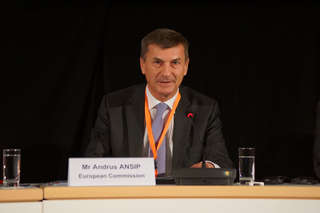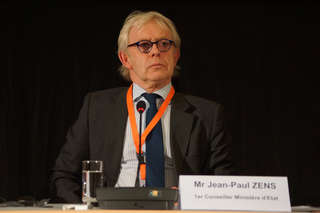The representatives of national parliaments of EU Member States who met in Luxembourg on 30 November and 1 December 2015 for the 54th meeting of COSAC chose to close their first working day with a discussion on the strategy for a digital single market in Europe. On this occasion, the European Commissioner for the Digital Single Market and Commission Vice-President, Andrus Ansip, presented this initiative launched by the European Commission on 6 May 2015. The objective of the initiative is to break down regulatory barriers in the digital age and to transform the 28 national markets into a single online market. Following the speeches given by national MPs, the Commissioner welcomed a 'large consensus' with regard to the establishment of the digital single market in Europe.
The Commission's strategy for the establishment of a digital single market defines 16 initiatives which revolve around three major areas: improving access to digital goods and services across Europe for consumers and businesses, creating a favourable environment and a level playing field for the development of innovative digital services and networks, and maximising the growth potential of the digital economy. According to the Commission, a fully functioning digital single market could represent a contribution of €415 billion per year for the EU economy and create hundreds of thousands of new jobs.
Andrus Ansip encourages the institutions to cooperate to make the digital single market strategy a success
 During his speech, the Commissioner for the Digital Single Market and Commission Vice-President, Andrus Ansip, spoke of a 'great opportunity for making Europe a dynamic digital space'. The digital single market strategy identifies 'what needs to be changed and what needs to be modernised in all aspects of the digital economy', he recalled, whether VAT, telecommunications, platforms, geo-blocking, or even personal data.
During his speech, the Commissioner for the Digital Single Market and Commission Vice-President, Andrus Ansip, spoke of a 'great opportunity for making Europe a dynamic digital space'. The digital single market strategy identifies 'what needs to be changed and what needs to be modernised in all aspects of the digital economy', he recalled, whether VAT, telecommunications, platforms, geo-blocking, or even personal data.
The Commissioner also announced that the Commission was about to publish a strategic paper on copyright before the end of December, as well as a legislative proposal by mid-December for the development of e-commerce through secure cross-border rules for consumers and businesses. He said that during the year, the Commission also launched 11 public consultations on topics such as online platforms and telecommunications.
On the subject of platforms, Andrus Ansip emphasised their 'increasingly important socio-economic role', adding that they bring innovation and prospects in terms of growth and employment. 'But some have concerns about the control of their data', he stated.
The Commissioner welcomed the progress made in the telecoms sector, particularly with the agreement concluded with the European Parliament and the Council on 30 June 2015 to end roaming charges by June 2017 and to guarantee an open internet. 'But there is still much to do to ensure that Europe acquires a competitive telecoms sector', he said.
To conclude, Andrus Ansip called on national parliaments to give their opinions and to participate in order to make the Commission's proposal a success. 'We need to create a digital single market but we can only do that by working together, with the support of national parliaments, the European Parliament and the Commission'.
Jean-Paul Zens calls for the creation of favourable conditions for digital businesses in Europe
 Jean-Paul Zens, First Government Counsellor of the Luxembourg Ministry of State, emphasised the fact that the digital single market is an integral part of the single market. 'Any obstacle to the digital world is also an obstacle to the offline world', he said, adding that despite the global and cross-border nature of the internet, the fragmentation of the internal market online into 28 national mini-markets was still noticeable. And these difficulties undeniably affect the European digital entrepreneurs trying to develop their businesses beyond national borders, he said.
Jean-Paul Zens, First Government Counsellor of the Luxembourg Ministry of State, emphasised the fact that the digital single market is an integral part of the single market. 'Any obstacle to the digital world is also an obstacle to the offline world', he said, adding that despite the global and cross-border nature of the internet, the fragmentation of the internal market online into 28 national mini-markets was still noticeable. And these difficulties undeniably affect the European digital entrepreneurs trying to develop their businesses beyond national borders, he said.
The speaker also reiterated that the Luxembourg Presidency fully supports the Commission's proposal for the establishment of a digital single market, by continuing the discussion in the Council and in other forums, and organising various events on the subject, including the 'European Data Forum' which was held in Luxembourg on 16 and 17 November 2015. Regarding the current legislative dossiers, Jean-Paul Zens said that the conclusion of the reform of personal data protection remains a priority of the Luxembourg Presidency because it is a 'prerequisite for the realisation of a digital single market'.
To conclude, the speaker emphasised the need to create favourable conditions for digital businesses in Europe, giving them the means to compete with industry giants.
National MPs' speeches
After the speakers' presentations, the MPs were invited to speak.
Jean Bizet, French senator, called for attention to be paid to the role of large platforms, which can impose their views on SMEs and encourage unfair competition.
Philippe Mahoux, Belgian senator, believes that it is necessary to take into account the digital divide, which, according to him, is still a reality.
Carl Schlyter, Swedish MP and former MEP (Greens/EFA) spoke about geo-blocking as a 'foolish and outdated' practice. On the subject of copyright reform, he insisted on the fact of ensuring it does not impede innovation and slow down innovative companies.
Philip Cordery, French MP, said that the digital strategy had to 'meet our growth targets' and that care must be taken for it not to create virtual taxation. In his opinion, the issue of digital taxation is essential in order to ensure that nothing escapes tax.

